Rand Paul’s Money Problem
Rand Paul Is at a distinct disadvantage compared to his fellow Republican candidates for President.
Rand Paul’s Presidential campaign appears to have some money problems:
In a presidential campaign defined by billionaire sugar daddy donors, Rand Paul has a problem: He doesn’t seem to have one.
While his rivals cultivate wealthy backers who will pump millions of dollars into their candidacies, Paul has struggled to find a similar lifeline. It’s led to considerable frustration in his campaign, which, amid rising concerns that it will not be able to compete financially, finds itself leaning heavily on the network of small donors who powered his father’s insurgent White House bids.
It hasn’t been for lack of trying. In recent months, Paul has sought to woo a string of powerful Republican megadonors — from Silicon Valley executives to a Kentucky coal mogul to the billionaire Koch brothers — who, it was believed, would be philosophically aligned with his free-market views. In each case, he met disappointment.
At the top of the list was Peter Thiel, the eccentric Northern California venture capitalist who funneled $2.6 million to Ron Paul’s presidential campaign. But Thiel is being far less generous this time around, leaving Paul’s crestfallen advisers with the distinct impression that he won’t give them a dime. They’ve been left guessing as to why. One speculated that Thiel, who didn’t respond to requests for comment, was unhappy with the rollout of Paul’s policy platform. Another surmised he was skeptical of Paul’s 2016 prospects or that he’d become tired of political giving and would sit out 2016 entirely.
There was Sean Parker, the flashy Napster co-founder who was portrayed by Justin Timberlake in the hit 2010 movie “The Social Network.” But Parker, who has known Paul for several years and has met with him to discuss 2016, isn’t expected to endorse Paul — or any Republican candidate, for that matter. Those familiar with Parker’s thinking say he’s most likely to provide financial support to Democratic front-runner Hillary Clinton.
There was Larry Ellison, the former Oracle CEO known for his penchant for megayachts. In October, Ellison hosted a Silicon Valley fundraiser for Senate Republicans that Paul attended — an event that led to speculation that Ellison, whose net worth is said to hover around $54 billion, would get behind the Kentucky Republican. But he’s instead thrown his support to Florida Sen. Marco Rubio and will host a fundraiser for him on June 9.
“It was love at first sight,” one person close to Ellison said of his feelings toward Rubio.
Not even two months into his presidential campaign, Paul is scrambling to compete with opponents who have established fundraising vehicles underwritten by well-heeled contributors. Jeb Bush has tapped his family’s formidable network of donors, a wide-ranging list of names that includes real estate developer Mel Sembler and Anheuser-Busch distributor John Nau, to fund a super PAC that’s expected to raise an historic $100 million by the end of this month. Rubio has won the backing of Norman Braman, a Miami auto dealer who’s expected to pour anywhere from $10 million to $25 million into his bid. Ted Cruz is expected to receive around $30 million of support from Robert Mercer, a New York hedge fund manager.
Even Rick Santorum, who barely registers in polls, is expected to have a deep-pocketed benefactor: Foster Friess, a businessman who helped keep Santorum’s 2012 presidential bid alive, has said he will donate again.
Paul is compensating by turning to his grass-roots supporters who fueled his national rise, bombarding them with pleas for cash. In recent days, many have highlighted Paul’s filibuster-style stand against the PATRIOT Act — opposition that has made him a hero to libertarians. “The clock is ticking,” read one appeal sent on Tuesday, a few days after his Senate theatrics. “I need to know you stand with me.”
The hope, those close to Paul say, is that his nationwide support from small contributors will make up for his billionaire deficit.
Grassroots donations is, of course, largely how Paul’s father financed his two Presidential runs, and how Paul himself financed his campaign for the Senate when he was facing off in a primary against a Republican who was backed by most of Kentucky’s Republican establishment. For all the press they generated, though, Ron Paul’s Presidential campaigns were very much shoestring operations that relied heavily on volunteers to spread the message, appear at rallies, and get the work of campaigning done, and running a statewide primary campaign is quite different from running for President. Senator Paul will still be able to rely on many of the same grassroots supporters that backed his father in the past, of course, but if he’s going to become a serious contender for the Republican campaign, he’s going to need to compete against candidates like Jeb Bush, Marco Rubio, Ted Cruz, and Scott Walker, each of whom will be tapping into donor networks that will be able to bring large amounts of money into their campaign coffers in a short period of time. In addition, they will have the support of SuperPACs backed by many of these same high-powered donors that will be able to spend monies in ways that the campaign itself cannot, but which will still be able to aid the electoral effort in states where getting enough of your voters to the polls or the caucuses will be the difference between victory and defeat.
This, of course, is one of the main reasons why Paul has taken such a public lead on issues like the PATRIOT Act and surveillance. These are issues he’s been talking about for years, so I don’t think it’s fair to say that he’s taking them just to raise money for his Presidential campaign, but it’s also clear that he put himself out in front of this issue the way that he did in no small part because of the free publicity it would generate for the campaign, which would hopefully lead to new donors and supporters. If he’s able to follow that up with performances in the polls and the upcoming debates that put him in the conversation as a serious contender along with candidates like Walker, Bush, and Rubio, then perhaps some of those well-healed libertarians that have been reluctant to write him checks will change their minds. If he’s unable to do that, though, then Paul’s campaign could end up being very short-lived.
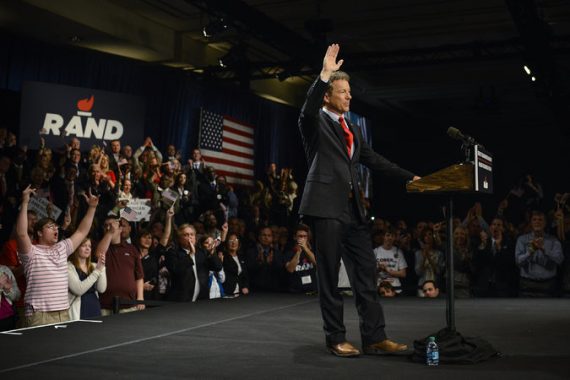

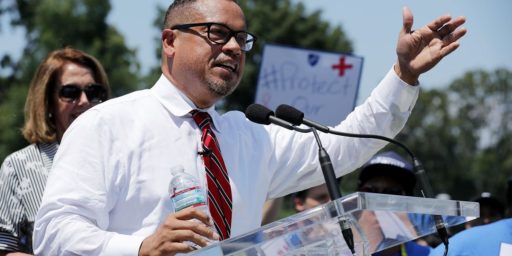
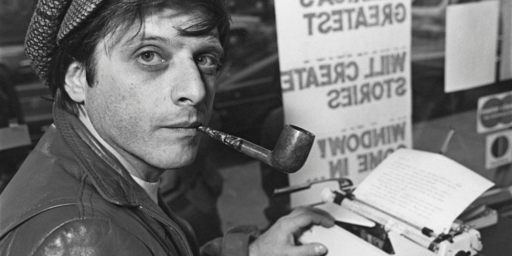
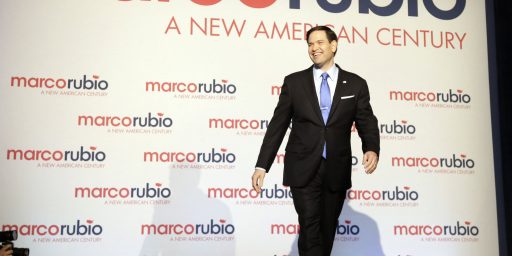
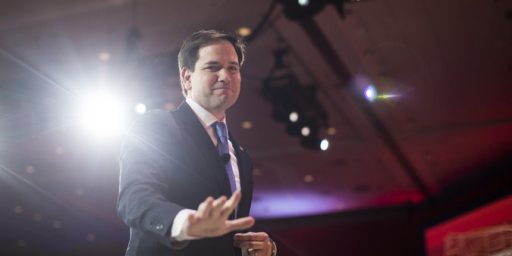
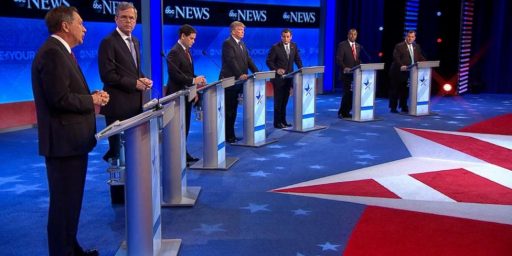
Aaaaawwwwwwwwwwwwww…….
(worlds tiniest violin playing on a distant shore)
Or, maybe, that Thiel has a reputation for being libertarian that is wholly unmatched by his actions. Anyone who names a financial spying company Palantir, after the evil scrying devices from the Lord Of The Rings trilogy, has a lot to explain.
Where is all the dark money from Citizens United going? To Scott Walker???
@C. Clavin: The Bush charities, but that’s not a problem for Jeb or anything.
I always thought the Kochs were glibertarians. They’re certainly happy to use their money to buy the government they want, and reap any special earmarks. Cause, they’re businessmen first, libertarians second.
What does this even mean? So he’s appealing to States Rights sentiments but won’t fight the federal laws against weed?
If 50 states, DC, PR and Guam and the other Islands all eliminated laws against cultivation and use of cannbis the Feds could crack your ass and imprision you for life and there still would be nothing to stop them.
If Dandy Randy Paul doesn’t want to go after US drug laws I got no use for him!
Rand Paul’s problem isn’t money. His problem is that he’s ineffective.
Who’s going to give money to an ineffective Senator? People who don’t have it.
I will say what is obvious but no one will touch…It’s his hair!
http://patdollard.com/wp-content/uploads/2013/06/rand-paul-dead-sea.jpg
That’s gotta’ be a rug.
I think the bigger problem is the presidential campaign is defined by billionaire sugar daddies.
Rand Paul is just a footnote.
@James Pearce:
Hard to say he’s ineffective after he helped stop the Patriot act.
I think the bigger problem is that Republican donors don’t like some of his politics….particularly on defense. And Democratic donors aren’t going to like his retarded stances on abortion and civil rights.
@C. Clavin:
The Patriot Act wasn’t stopped so much as it was renamed. Paul’s actions on the subject marginalized him within his own party, and worse, had little to no effect on the eventual outcome. From a pure “effectiveness” perspective, well, he wasn’t.
I’m just not that impressed by symbolic victories, especially if they turn out to be symbolic and pyrrhic.